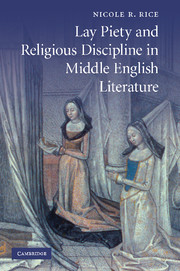Book contents
- Frontmatter
- Contents
- Preface
- Acknowledgments
- Abbreviations
- Introduction
- Chapter 1 Translations of the cloister: regulating spiritual aspiration
- Chapter 2 Dialogic form and clerical understanding
- Chapter 3 Lordship, pastoral care, and the order of charity
- Chapter 4 Clerical widows and the reform of preaching
- Conclusion: Spiritual guides in fifteenth-century books: cultural change and continuity
- Notes
- Bibliography
- Index
- CAMBRIDGE STUDIES IN MEDIEVAL LITERATURE
Chapter 4 - Clerical widows and the reform of preaching
Published online by Cambridge University Press: 30 June 2009
- Frontmatter
- Contents
- Preface
- Acknowledgments
- Abbreviations
- Introduction
- Chapter 1 Translations of the cloister: regulating spiritual aspiration
- Chapter 2 Dialogic form and clerical understanding
- Chapter 3 Lordship, pastoral care, and the order of charity
- Chapter 4 Clerical widows and the reform of preaching
- Conclusion: Spiritual guides in fifteenth-century books: cultural change and continuity
- Notes
- Bibliography
- Index
- CAMBRIDGE STUDIES IN MEDIEVAL LITERATURE
Summary
As the Wife of Bath concludes her Tale, Friar Huberd has some choice words for her:
Ye han heer touched, also moot I thee,
In scole-matere greet difficulte,
Ye han seyd muche thyng right wel, I seye;
But, dame, heere as we ryde by the weye,
Us nedeth nat to speken but of game,
And lete auctoritees, on Goddes name,
To prechyng and to scoles of clergye.
It is not clear whether the friar is responding specifically to the Tale, with its depiction of the hag's sermon on “gentilesse,” or to the Wife's own Prologue sermon on the “wo that is in mariage”: he probably objects to both. Either way, his comment not only implies that moral “scole-matere” may be unfit matter for pilgrimage tale-telling, but more significantly registers his resistance to the appropriation of clerical “auctoritees” and a “prechynge” voice by this widowed “dame.” Whether or not the Friar is alluding to “[l]ate fourteenth-century Lollardly activities,” it is clear that “his comments read as a reaction to the Wife's words which threaten the established monopoly of authorized men on religious interpretation.” The authority to preach, a public form of “religious interpretation” and always a contested element of clerical discipline, had rarely been more controversial than during the last decades of the fourteenth century, when debate began to rage over the proposition by some Wycliffites that laypeople, women included, should be able to preach the gospel.
- Type
- Chapter
- Information
- Lay Piety and Religious Discipline in Middle English Literature , pp. 105 - 132Publisher: Cambridge University PressPrint publication year: 2009



